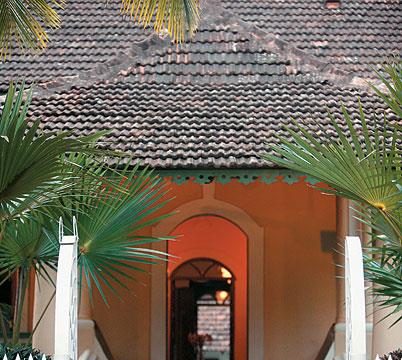There are those who hold that Goa has gone to the dogs. But then they haven’t stayed a night at the Vivenda dos Palhaços. They haven’t paid their respects to Toby, basset hound-in-residence. They haven’t retired to the dim-lit confines of the Chummery for an afternoon nap. They haven’t sipped beer on the veranda and watched life in rural Salcete go by. I have, so I’d suggest you take my word for it.
Once you emerge from Dabolim airport, turn south, not north. When there’s just a hint of South Goa in the air, you’ll be in Majorda. Turn away from the beach and towards the village, to the Costa vaddo, and down a quiet lane where Simon and Charlotte Hayward (and Toby Basset) have laid out the red carpet for you (I exaggerate, of course—you’ll probably only interrupt their siesta). The brother-sister duo, may their tribe increase, have rescued another crumbling Goan mansion from oblivion, in a remarkable and affectionate bit of restoration. They’re not your usual wide-eyed expats either. Simon and Charlotte (they’re English) were born and brought up in India, being the fourth generation of the family to live in the country, and by all accounts they’re taking it sportingly.
Immediately upon arrival at the Vivenda, and at alarmingly frequent intervals thereafter, someone will offer you a drink. This should not surprise you, seeing as Simon’s grandfather set up the Bengal Distilleries Co. around 1905, manufacturing spirits under the brand name Hayward’s (so now you know why the name seems familiar). The company was sold to Shaw Wallace in the 1950s, and Simon’s father worked for them for many years. The legendary beer to which the family lent its name is to this day the favoured tipple of truckers across the length and breadth of the subcontinent. Vivenda’s Lorry Back Bar (the painted back of a truck forms the bar’s shutter and, being Goa, is always down) pays cheery tribute to this devoted clientele.
Simon, who gave up a cushy advertising job in Mumbai to set up the place, bumped into the house a few years ago and promptly snapped it up. That the house was earlier held by the proprietors of Big Boss feni seems entirely apt. The Portuguese house, at the front of the property, was built in 1929. Towards the back is a house with rammed earth walls, which is a bit older. After some frenetic restoration, a few seasons ago the Vivenda welcomed its first visitors.
Each of the seven rooms (one is a tent in the back garden) is unique, has been done up in a distinctive style and named after places in India where the family has lived (in Bengal and Tamil Nadu). As you enter the house, to the right is the spacious Konnagar, replete with four-poster bed and private balcony, named after the settlement on the Hooghly where the original Hayward distillery came up. The large bathroom boasts a cast iron bathtub rescued from the Royal Bombay Yacht Club. (This is a house of curiosities — the barber’s and dentist’s chairs plonked on the balcony, picked up during Simon’s stints in Singapore and Hong Kong, made me extremely jealous.) To the left is Alipore, whose long and narrow bathroom was created by enclosing the space between the two houses. Further on, in the older house, are Madras and Ballygunge. I’m in Ooty. Sitting pretty in the middle of the courtyard, the all-white Ooty, which has a bold open bath with smashed mirror mosaic walls and nude prints, used to be the kitchen. Beyond the pool in the back garden is Chanpara, a tent kitted out with old camping furniture, which recalls the shooting camp 40 miles north of Calcutta where Simon spent many happy Christmases as a child. But the real jewel is revealed last — Chummery, a self-contained cottage behind the main house, with its own private sit-out. Vivenda dos Palhaços, the unremittingly curious may note, means House of Clowns (long story, ask Charlotte).
The many eclectic spaces that make up the Vivenda are as diverse and engaging as an entire circus troupe, though — the quirky rooms, the several sit-outs, places to lounge in, place to be quiet and alone in. The collectibles, the art, the family photographs, the massive dining table of local mutti wood, the comforting church pews donated by a friend, the bric-à-brac…all come together to create something so much more than ‘boutique hotel’. It’s a home, where you’re a privileged guest.
The pink photo album at the bar charts the restoration in pictures. Artisans from Rajasthan were brought in to do the Indian Patent Stone floor (known to us as the ‘red oxide’ floor, but a charming terracotta hue here) and the terrazzo bathrooms and the lovely, lovely traditional mirror-smooth plastered walls. The teak doors and windows were stripped of thick brown paint to reveal the delicate grain below. Rafters on which paddy-threshing mats used to be stacked have been preserved, but the overhead lighting nestled in a coconut tree trunk is a new addition among the beams. For all that, the Vivenda wears its new clothes lightly, with nary a snooty brick in its walls. It’s just another house in the village, attuned to its surroundings.
The hospitality à la Vivenda is as lively and old-fashioned. They feed you well. The menu for the evening’s three-course dinner is displayed at strategic locations around the house from crack of dawn, leaving you no option but to sign up. The day I dined, Chef Russell offered vegetable samosas with tamarind relish, a memorable chorizo and chicken roulade with spicy yam mash and a sweet finish of banana beignets and rum-raisin ice cream. When the weather is nice, meals are served at the huge concrete altar table in the back garden.
Contact 0832-3221119, vivendagoa.com




